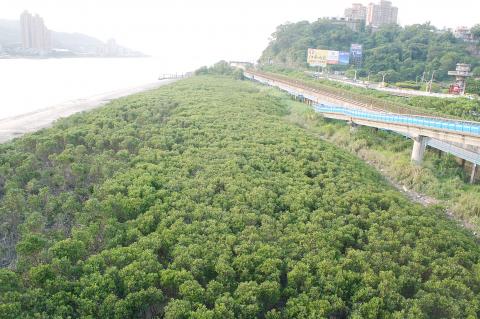The Taipei High Administrative Court’s decision to nullify an environmental impact assessment (EIA) committee’s approval of the proposed Tamsui-Taipei expressway project on Wednesday has drawn different reactions from the Taipei City and New Taipei City (新北市) governments, with the former saying it respects the court’s decision and the latter vowing to continue the construction.
“Because the EIA approval is still valid at this point and construction has already begun, the project will continue,” New Taipei City Mayor Eric Chu (朱立倫) said yesterday, adding that the city would seek to balance the public’s reaction and the need to preserve the environment, as well as ask the Environmental Protection Administration (EPA) to continue with an appeal of the case.
Taipei City Mayor Hau Lung-bin (郝龍斌), on the other hand, said the city respects the court’s decision.

Photo: Lai Hsiao-tung, Taipei Times
“We will need to communicate with the residents about the budget of the project as well as other relevant issues,” he added. “The project will continue only if we secure the approval of local residents.”
The proposed expressway is about 4.7km long and is to connect Highway No. 2 in New Taipei City’s Tamsui (淡水) and the intersection of Dadu Road (大度路) and Zhongyang N Road (中央北路) in Taipei City. The project was estimated to cost NT$4.6 billion.
While some people argued that the new expressway would ease traffic congestion on Highway No. 2, some local residents do not see the project as an effective solution to the problem.
“Tamsui does not need this kind of construction, which would benefit mostly real-estate developers,” resident Chang Chien (張簡) said.
Another Tamsui resident surnamed Hsu (許) said the biggest problem causing constant traffic congestion on Highway No. 2 was perpetual government constructions on the highway.
“Although that main road has three lanes, often only one or two lanes are available,” she said.
Hsu also questioned the necessity of building the expressway, given that the government has already approved the construction of a light-rail transport system and has been encouraging people to use public transportation more often.
Construction of the Tamsui-Taipei expressway was first proposed by the Directorate-General of Highways in 1996. It was turned down by the EIA committee in 2000, but the proposal was again tabled by New Taipei City in 2008 and was conditionally approved by the EIA committee.
Environmentalists who oppose the construction filed an administrative lawsuit in April seeking to nullify the EIA committee’s approval.
According to the verdict on Wednesday, the EIA committee approved the project based on insufficient information and the conditions it set also failed to consider if New Taipei City has the ability to meet those conditions.
The committee also failed to ascertain if the construction would damage the Mangrove Forest Conservation Area, nor did the committee provide specific requirements on the types of hedges to be constructed to serve as a buffer between the construction and the conservation area, the verdict said.

Chinese Nationalist Party (KMT) Chairman Eric Chu (朱立倫), spokeswoman Yang Chih-yu (楊智伃) and Legislator Hsieh Lung-chieh (謝龍介) would be summoned by police for questioning for leading an illegal assembly on Thursday evening last week, Minister of the Interior Liu Shyh-fang (劉世芳) said today. The three KMT officials led an assembly outside the Taipei City Prosecutors’ Office, a restricted area where public assembly is not allowed, protesting the questioning of several KMT staff and searches of KMT headquarters and offices in a recall petition forgery case. Chu, Yang and Hsieh are all suspected of contravening the Assembly and Parade Act (集會遊行法) by holding

PRAISE: Japanese visitor Takashi Kubota said the Taiwanese temple architecture images showcased in the AI Art Gallery were the most impressive displays he saw Taiwan does not have an official pavilion at the World Expo in Osaka, Japan, because of its diplomatic predicament, but the government-backed Tech World pavilion is drawing interest with its unique recreations of works by Taiwanese artists. The pavilion features an artificial intelligence (AI)-based art gallery showcasing works of famous Taiwanese artists from the Japanese colonial period using innovative technologies. Among its main simulated displays are Eastern gouache paintings by Chen Chin (陳進), Lin Yu-shan (林玉山) and Kuo Hsueh-hu (郭雪湖), who were the three young Taiwanese painters selected for the East Asian Painting exhibition in 1927. Gouache is a water-based

Taiwan would welcome the return of Honduras as a diplomatic ally if its next president decides to make such a move, Minister of Foreign Affairs Lin Chia-lung (林佳龍) said yesterday. “Of course, we would welcome Honduras if they want to restore diplomatic ties with Taiwan after their elections,” Lin said at a meeting of the legislature’s Foreign Affairs and National Defense Committee, when asked to comment on statements made by two of the three Honduran presidential candidates during the presidential campaign in the Central American country. Taiwan is paying close attention to the region as a whole in the wake of a

OFF-TARGET: More than 30,000 participants were expected to take part in the Games next month, but only 6,550 foreign and 19,400 Taiwanese athletes have registered Taipei city councilors yesterday blasted the organizers of next month’s World Masters Games over sudden timetable and venue changes, which they said have caused thousands of participants to back out of the international sporting event, among other organizational issues. They also cited visa delays and political interference by China as reasons many foreign athletes are requesting refunds for the event, to be held from May 17 to 30. Jointly organized by the Taipei and New Taipei City governments, the games have been rocked by numerous controversies since preparations began in 2020. Taipei City Councilor Lin Yen-feng (林延鳳) said yesterday that new measures by